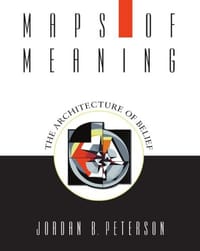Why have people from different cultures and eras formulated myths and stories with similar structures? What does this similarity tell us about the mind, morality, and the structure of the world itself? Maps of Meaning offers a provocative new hypothesis that explores the connection between what modern neuropsychology tells us about the brain and what rituals, myths and religious stories have long narrated. Drawing insights from the worlds of neuropsychology, cognitive science, and Freudian and Jungian approaches to mythology and narrative, Jordan B. Peterson argues that myths and religious stories have a structure determined by the nature of the mind, and play a key role in the regulation of human emotions.
Ambitious in scope and daring in its exploration of ideas, Maps of Meaning presents a rich theory that makes the wisdom and meaning of myth accessible to the critical modern mind.</P>
Jordan B. Peterson is a Canadian clinical psychologist, self-help writer, cultural critic, and professor of psychology at the University of Toronto. His main areas of study are in abnormal, social, and personality psychology, with a particular interest in the psychology of religious and ideological belief, and the assessment and improvement of personality and performance.
Peter...
显示全部

